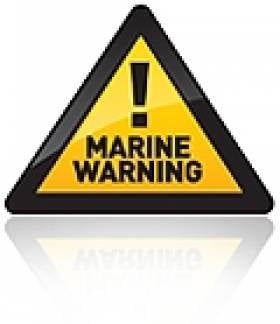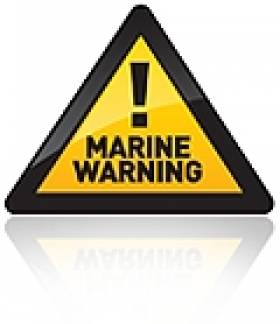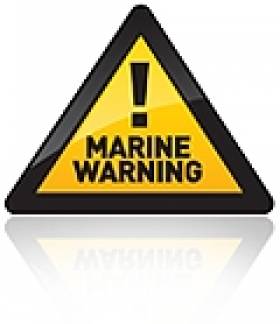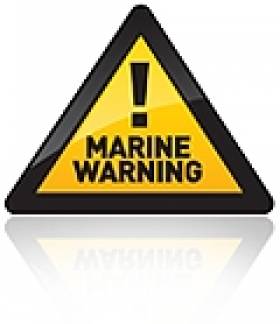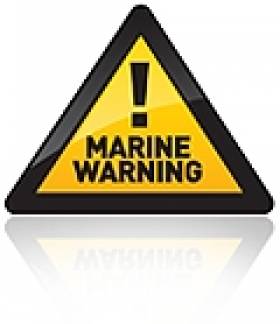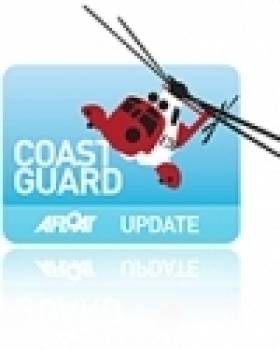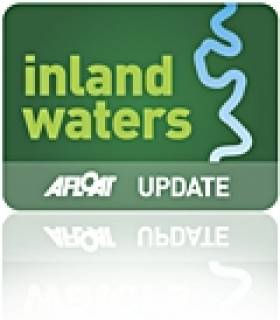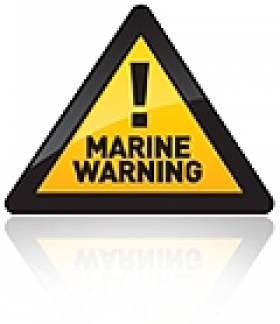Displaying items by tag: warning
UK Coastguard Warns on Tides and Sea Safety
As the UK Bank holiday approaches the UK coastguard has issed a warning to check tides and stay safe. With the school holidays well underway and the busy bank holiday weekend around the corner, coastguards and the Shipping Minister are coming together to remind families, children and visitors of the importance of checking weather and tide times to stay safe whilst at the beach and along the coast.
Already this summer coastguards have dealt with many beach-related incidents, with a particularly high number of people being caught out by the tide and needing to be rescued after becoming stranded. Since 1st July, almost 150 such rescues have been carried out around the UK coast, with around 80% involving children.
This latest advice is part of an ongoing programme by the Maritime and Coastguard Agency to remind those who visit our coast to have a great time and remain safe. So before you go check out the weather, sea conditions and the tide times (you can find this information on the web or many beaches display it at their entrance). That way you can enjoy the sea safely.
In addition to checking the tide times, remember that inflatable boats and toys can be great fun, but they are more suitable for use in swimming pools than at the beach. If you do use one at the beach, make sure that it is tethered to an adult who is in the sea with you and never use it if there is an offshore wind. Inflatable boats and toys can easily be blown off shore, then overturn. If you are blown out to sea on an inflatable boat or toy wave your arms in the air and shout for help. If you are out of your depth, don't attempt to swim back to shore.
Be careful around cliffs and rocks – they can be slippery and crumbly. Don't climb them unless you are properly kitted out. And don't attempt to rescue people or dogs from cliffs – call 999 and ask for the coastguard.
Coastguards are also encouraging parents, grandparents and other adults to ensure that children are properly supervised on the coast. We deal with numerous cases of lost children every year and it can be very distressing for children and adults alike. Some beaches provide beach band schemes which help to re-unite children with their families if they become separated, so take advantage of these schemes if appropriate.
Try to go to a lifeguarded beach if you can and stay within the flagged area.
If you notice that someone is in difficulty, either alert the lifeguard if one is available or call the Coastguard on 999.
Shipping Minister Mike Penning said:
"As an island nation, enjoying a seaside holiday is a great British tradition. The UK has some of the finest coastline in the world, and I want everyone to be able to enjoy it safely. Already this year we have seen how something as simple as familiarising yourself with the tide times before you set out can make all the difference. That is why I am encouraging anyone thinking of heading for the coast to take a few sensible precautions so they return home safely and with fond memories of a great day out. I would also like to pay tribute to our coastguard staff and volunteers who do such a great job to keep those who use our coastline as safe as possible."
Warning to the Public
WARNING TO THE PUBLIC AIR CORPS FIRING EXERCISES AND AIR DEFENCE ARTILLERY FIRING EXERCISES
From Tuesday 14th June to Saturday 18th June 2011 (inclusive) From Monday 20th June to Saturday 25th June 2011 (inclusive) From Monday 27th June to Friday 1st July 2011 (inclusive) Daily from 09.00hrs to 17.30hrs
At GORMANSTON, CO. MEATH IT IS DANGEROUS FOR PERSONS, SHIPPING, LIVESTOCK OR AIRCRAFT ETC., TO BE WITHIN THE DANGER AREA WHILE FIRING IS IN PROGRESS.
The DANGER AREA comprises the lands of GORMANSTON CAMP and the air and sea area contained within a circle having a radius of 3NM (5.4KM) centred on GORMANSTON CAMP with an additional area contained within the segment centred on GORMANSTON CAMP and bearing 015° T, through MOSNEY RAILWAY STATION and 106° T, through GORMANSTON RAILWAY STATION seaward for the distance of 10NM (18.5 KM) The DANGER AREA extends from SEA LEVEL to a height of 7,000ft.
RED FLAGS will be flown at BEN HEAD and GORMANSTON RAILWAY STATION when exercises are taking place.
OBJECTS found on the RANGES may be HIGHLY DANGEROUS and the PUBLIC ARE WARNED of the risk of handling or interfering with such objects.
NO REWARD of any kind will be made for the finding of objects of a military nature on the ranges.
MICHAEL HOWARD
SECRETARY GENERAL
DEPARTMENT OF DEFENCE
Don't Drink and Drown this Sumer - UK Coastguard Issues Warning
Liverpool Coastguard requested the launch of Workington RNLI all weather lifeboat and sent Whitehaven Coastguard Rescue Team to the scene. After a search in darkness for the casualty vessel which had no navigation lights, Liverpool Coastguard received a 999 call by mobile phone from one of the occupants of the boat. Workington lifeboat then located them further north of the initial sighting and towed the broken down vessel into Workington.
Members of the public were concerned for their safety because the men appeared to be drunk before departing the harbour. It was reported that the two men had boarded the boat in Harrington Harbour earlier in the evening and that the skipper had fallen overboard in the outer harbour and his friend had got into the water to help him back in before they set off towards Workington. The boat was seen broken down and drifting about a quarter of a mile offshore just before nightfall.
Liverpool Coastguard Graham Parr said,
"As the weather warms up more people want to get out and enjoy being on the water but please don't take unnecessary risks this summer; don't drink and drown. Not only does it impair judgement but alcohol will also affect your ability to deal with an emergency situation.
Always check your vessel is seaworthy before setting out and if you must travel in darkness, navigation lights are both vital and mandatory.
For guidance, see SOLAS V regulations for pleasure craft http://tinyurl.com/3nns78m
Surveyors Issue Boat Launch Warning
Boat owners are being warned of of the lasting consequences of the winter's big freeze and the possible damage to boats on launching this season.
At the most recent meeting of the Irish Branch of the International Institute for Marine Surveying members highlighted a real danger of some boats sinking shortly after being launched due to cracked pipe work on intakes and discharges where fresh water was not drained from cooling and other systems.
Owners and Boat yard employees are reminded to check carefully all pipe work prior to launching boats and immediately when the boat enters the water. Check that all valves are operating correctly. Complete a full check for leaks and monitor the bilge water during the first few hours when the boat has been re-launched.
Engine blocks should also be checked for frost damage prior to staring them. Do not start them if you see fractures, have the engine checked by a marine mechanic if in any doubt whatsoever. Batteries may also be dead and need of replacement due to the severe weather experienced over the Winter months.
Coastal Flooding Risk Warns Irish Water Safety
Flood conditions expose the public to hazards they need to be aware of. Fast moving water can exert pressure of up to four times its speed against the legs of someone attempting to cross it. Because water displaces bodyweight, the deeper a person becomes immersed the less the person weighs so the more difficult it is to remain upright. Never put ones feet down if swept away in floodwater, because foot and body entrapments and pinning are the leading cause of accidental death in rivers and fast flowing water.
Motorists need to be vigilant to avoid flooded areas on roads but particularly near rivers; with poor light and short days it is not possible to determine the depth of floods easily. Swift water will carry cars and other vehicles away and there have been very tragic drownings in the past as a result.
Children are naturally curious about water, therefore parents should caution them that floodwater hides the true depth and that manhole covers may be open and that small streams when swollen are very fast and deeper than normal.
What should I do when I hear a Flood Warning?
· Listen to the national and local radio for met eireann updates and AA Road watch updates
· Check on neighbours particularly if they are elderly, infirmed or families with young children
· Move your vehicles to higher ground
· Move animal stock to higher ground
· Check your small craft to ensure they are well secured or moored
· Make sure you have warm clothes, food, drink, a torch and radio.
· Block doorways and airbricks with sandbags or plastic bags filled with earth. Floodgate products will also work effectively.
· Switch off gas and electricity supplies if flooding is imminent.
· Check the time of High Water in the Newspaper or on http://easytide.ukho.gov.uk/EASYTIDE/EasyTide/SelectPort.aspx
· Check out www.flooding.ie for more detail on General flooding
Personal Safety
· Avoid flood waters at all times
· carry a mobile phone at all times in case you need to call for help - call 112 in emergency
· Wear suitable protective clothing & a lifejacket on or around water
· Do not enter fast flowing water.
· Never put your feet down if swept away by fast flowing waters
· Flooding on roads will be deeper at dips and around bridges.
· Stay away from sea and flood defences.
· when walking or driving, be aware of manhole covers and gratings that may have been moved due to the heavy flow of water.
· Take care when using electric appliances in damp or flood conditions.
· Remember that during the hours of darkness the dangers are multiplied.
After the flood
· Avoid eating food that has been in contact with flood water.
· Run water for a few minutes and wash your taps.
· Check gas and electricity supply.
· Leave wet electrical equipment alone to dry and have it checked prior to use.
· Ventilate your property well.
· Check on elderly neighbors.
Warning - Snow Bound Harbours Pose Major Risk
Snow bound harbours and ice covered jetties in particular are dangerous to walk on or near because of the risk of slipping, tripping or falling near to the water's edge.
Sections of the Royal and Grand Canals and the Shannon Erne Waterway have restricted navigation due to ice accumulation.
Where water in lock chambers has frozen the public is warned not to attempt to cross over a lock in this state due to the great danger of ice cracking underfoot and being drowned in the lock.
Warning Issued as Logs Fall from Vessel off South East Coast
The Waterford-based Coast Guard helicopter has already investigated and some of the cargo has washed up on the south east coast. The vessel was on passage from Portavogie (Scotland) to Youghal, when the incident occurred.
Weather conditions in the area are winds south westerly force 5/6 with moderate visibility. A navigation warning has been issued to vessels in the area.
Safety Precautions for Vessels and Crew
Owners and masters availing of winter mooring facilities for their vessels on any of Waterway Ireland's navigations are advised to choose a sheltered berth within the harbour, place adequate fendering between the vessel and the harbour wall and secure the vessel with double mooring lines.
The vessel should be monitored on a regular basis in the event that it should be taking or making water and particularly so after a period of stormy or frosty weather.
Owners visiting harbours during this period and who intend to work on their vessels should bear in mind the changed environmental conditions at this time of year and to take the appropriate measures necessary to reduce risks associated with working on or near water.
It is advised that personal protective clothing, to guard against the cold and the wet, including a personal flotation device, should be worn and all items checked for serviceability beforehand, bearing in mind:
• Low air temperatures
• Low water temperatures
• Reduced daylight
• Inclement weather
• Raised water levels
• Flood conditions including increased rates of flow
Working on or near water should preferably be undertaken in the company of a colleague. Lone working should be avoided if possible and especially at remote locations. Ensure that someone has been informed of your whereabouts and expected time of return.
Further, carry a mobile phone and/or a handheld Marine VHF, fully charged, for keeping in contact while being aware that full phone coverage is not available everywhere.
Gale force westerly winds Gusting to 140km/h
Met Eireann have issued a severe weather warning.
Southerly gales or strong gales developing this evening and for a time tonight on all coasts and on the Irish Sea. Winds veering westerly tonight and continuing to reach gale force on coasts from Roches Point to Erris Head to Malin Head overnight.
Stormy conditions will affect Ireland Thursday afternoon, evening and for much of Thursday night. Gale force westerly winds will gust between 100 and 120 km/hr generally, but gusts of up to 140 km/hr are expected in exposed parts of Connacht and Ulster. These winds are likely to lead to some structural damage and will be accompanied by high seas on Atlantic coasts. Winds will moderate considerably towards dawn on Friday.
More HERE



























